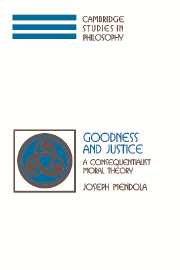4 - Intuitive Hedonism
Published online by Cambridge University Press: 22 July 2009
Summary
Multiple-Act Consequentialism must be accompanied by a basic normative principle, and the basic normative principle proposed here is the Hedonic Maximin Principle. HMP has two elements, which are developed in this and the following part. The next part concerns its maximin structure. This part concerns its hedonism.
Hedonism is the view that pleasure is the basic ethical or normative value, and pain the basic disvalue. Chapter 5 will argue that hedonism is true, whether we like it or not and whatever our normative intuitions. But this chapter argues that it is appropriately intuitive.
The hoary philosophical tradition of hedonism suggests that it is at least reasonably and roughly intuitive. But philosophers no longer treat it that way. For the most part, they think that they know it to be obviously false on intuitive grounds, much more obviously false on such grounds than familiar competitors. I will argue that this consensus is wrong. I will defend the intuitive cogency of hedonism relative to the now dominant desire-based and objectivist conceptions of well-being and the good. I will argue that hedonism is still a contender, and indeed that our current understanding of commonsense intuition on balance supports it.
It may seem quite unlikely that such an argument will succeed. For instance, here is Sumner's relatively sympathetic evaluation of hedonism's prospects:
Time and philosophical fashion have not been kind to hedonism. Although hedonistic theories of various sorts flourished for three centuries or so in their congenial empiricist habitat, they have all but disappeared from the scene. […]
- Type
- Chapter
- Information
- Goodness and JusticeA Consequentialist Moral Theory, pp. 105 - 138Publisher: Cambridge University PressPrint publication year: 2006



